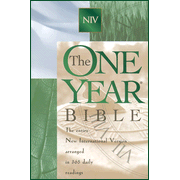The One Year Bible

I hope all is going well. I have settled into a nice routine in my Bible reading. I have been getting up a bit early every morning and I read before I have my breakfast. It is working well for me. I hope you have found a time that works for you. I have enjoyed this past weeks readings with some great verses and plenty for my brain to chew on for a while. I just want to highlight a few things this week.
Where We Have Been
The Old Testament
The story of Joseph wraps up with today’s reading. It has been a longer story than most and there is good reason for it. First of all this is the back-story for the most important event in Jewish history, The Exodus. The Exodus tells of God’s love and mercy for his chosen people and how he redeemed them from slavery in Egypt. As a New Testament Christian this story foreshadows the story of how Jesus redeemed us from the slavery of sin. But lets not get ahead of ourselves. As we read the Old Testament we see many similarities between it and some stories in the New Testament. I believe that this is on purpose. Theologians call this Biblical Typology. I found this description of typology in a resource I have entitled “Fellowship With God” written by Rev. Henry F. Fingerlin.
“The Bible is an amazing book. But something not too commonly know is that the Bible contains a unique kind of prophecy that no other book contains or could contain, namely, Typology. In Romans 5:14b St. Paul says that “Adam...was a type of the one who was to come.” (That is Adam was a type of Christ). In I Peter 3:21 Peter tells us that Baptism “corresponds” to Noah’s ark in which 8 persons were saved through water. The word translated “corresponds” in the Revised Standard Version is antitype in Greek. There are many such “types” and “antitypes” in the Bible. For example the Passover Lamb and the scape-goat, who bore the sins of the people, are types of Jesus; and the work of the High Priest in making sacrifice for the sins of the people is a type of his saving work. Types, copies, shadows, miniatures, scale model, partial, earthly, temporal, limited, imperfect—these are the people, observances and events of the Old Testament. Fulfillment, spiritual, eternal, perfect, unlimited—these are the realities, the completion, the fulfillment brought into being through Jesus and the New Covenant. This is the way Jesus and the Apostles understood the Old Testament and its fulfillment in the New. Only God who knows the future and also brings it to pass, could so thoroughly detail through prophecy and types all that would transpire through John the Baptist, Jesus, and the beginning of the New Covenant.”
There is much to say about Biblical typology but one thing to remember is that Old Testament Biblical types are always less than the New Testament antitype. As Paul writes in Colossians 2:17, “These are a shadow of the things that were to come; the reality, however, is found in Christ.”
How does this relate to the story of Joseph? Some theologians see Joseph as a “type” or Christ. Here are a few examples:
Joseph is the “beloved” son of his Father(Gen. 37:3)—Jesus is the Father’s “beloved” son (Matt. 3:17
Though innocent, Joseph is sold for silver (Gen. 37:28)—Jesus is betrayed and sold for silver (Matt. 26:15)
Joseph finds himself in prison with two other criminals (Gen. 40)—Jesus suffered death (a kind of prison) between two criminals (Luke 23:32-33)
Joseph foretells death to one prisoner and release and restoration of the other (Gen. 40:9-19—Jesus tells one of the thieves that he will be with him in paradise while the other dies in his sins (Luke 23:42)
Joseph is freed from prison by a decree of Pharaoh (Gen. 41:37-41)—Jesus is freed from the prison of death by the Fathers decree of Life, Resurrection, for His Son (Acts 2:24)
Joseph is exalted at Pharaoh’s right hand and given a name that is above all names (Gen. 41)—Jesus is exalted to his fathers right hand and given a name that is above every other name (Phil. 2:9-11, Acts 2:33-36)
There are others that we could talk about but these are the big ones. I will be highlighting some more typology as we go this year. Let me know what you think about typology. Remember you can't always say that something is a “type” of Christ, but if you see something that you may think is let me know and I will do some investigating for you.
The New Testament
We read a few more parables of Jesus as well as read about some miracles including the feeding of the 5,000 and just as amazing, the feeding of the 4,000. One of the most powerful passages we read came in Ch. 16. Peters confession of Christ is a powerful witness to the divinity of Jesus and his claim to be the Messiah. After hearing Jesus preach and witnessing his miracles he boldly professes “You are the Christ (Messiah) the Son of the living God. Either Peter was crazy or he was convinced that this simple man from Nazareth was the promised Messiah.
Where We are Going
The Old Testament
We will get into the story of the Exodus with a new character, Moses. Once again try to see how Moses can be a “type” of Christ.
The New Testament
A lot more teaching from Jesus for this coming week. The narrative story will begin to pick up in a few weeks.
Key Verses:
Matthew 13:45-46
Psalm 18:32-33
Matthew 14:27
Psalm 19:14
Psalm 20:7-8
Sorry for such a long post today. I hope it has been a blessing for you.



